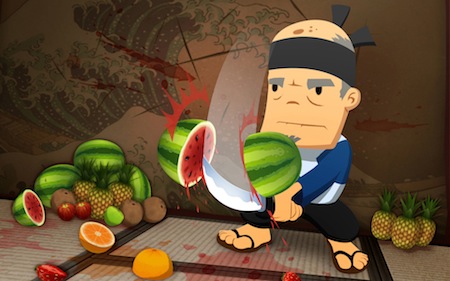The Game That Saved Halfbrick
You may recall an article we linked to a few weeks ago by Shifty Jelly, it was a post that detailed how the life of an independent developer isn’t exactly as glamorous as it sometimes seems. Their point was that the big success stories of developing for the iPhone aren’t universal. Nonetheless, Kotaku Australia today posted a long feature on Halfbrick, a small game studio that was close to closing its doors before it hit success with Fruit Ninja.
In early 2010, Halfbrick released a PSP mini called Rocket Racing. After years working on licensed titles for the GameBoy Advance and DS, they were finally working on their own IP. Rocket Racing received a lukewarm critical reception. It was abstract, sleek, complicated, and challenging. It was also a commercial failure. The studio had poured six months into developing the game — it was a heavy investment for a small studio — and it didn’t need a commercial flop at a time when things weren’t looking good for the Australian games industry.
It’s a fascinating and lengthy read that I encourage you to read for yourself. It goes into details about how Fruit Ninja was created, some of the influences for it and a bit about the company culture.
The studio has 50 employees, internally divided into smaller teams that work on their own games. So what was the transition like for the developers? How did it feel to go from working on complex PSP and Xbox Live games to back-to-basics iOS titles.
“It was so, so, so refreshing,” says Muscat.


